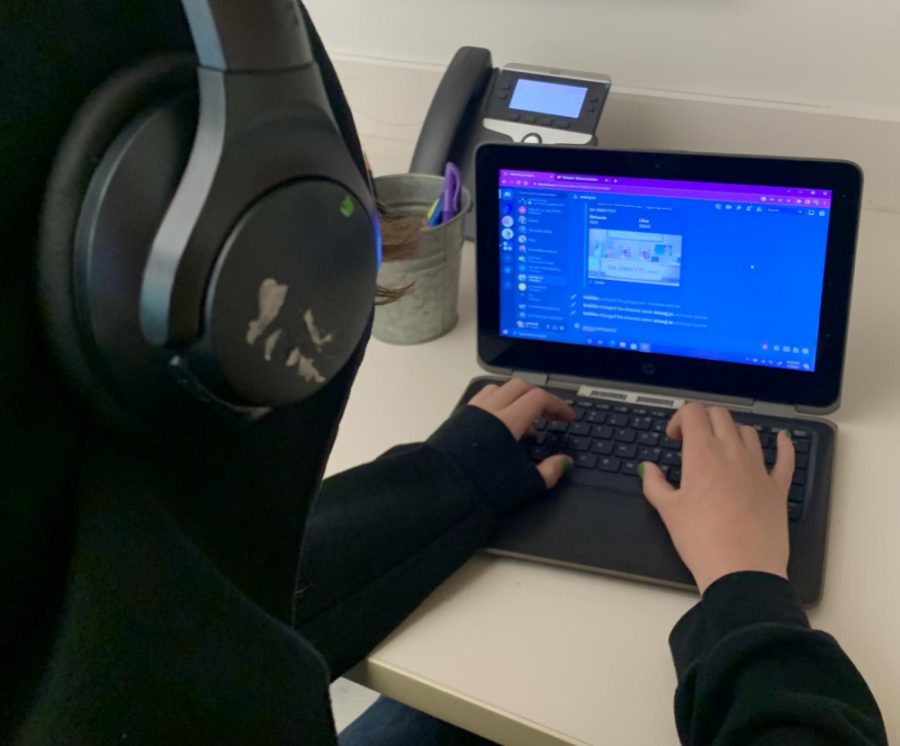Op-Ed: “Modern” cyber-safety is seriously outdated
A student clicks away on Discord at school, one of the most popular messaging apps among teenagers.
In elementary school, my computer lab teacher’s name was Ms. Slutz. That isn’t the most important detail, nor is it entirely relevant to any point I’m about to make, but it’s important to me that you know that.
Anyway, once a week, my homeroom and I would all gather in the computer lab, and Ms. Slutz would inform us of what we were doing that day. Then, we would walk to our computers, turn down the brightness and play Poptropica.
However, when we did actually do what we were meant to, it usually involved watching videos of fictional animated characters lecturing us about internet safety in a way that none of us took seriously. Imagine wanting to beat your high score on Papa’s Freezeria, but instead you had to listen to a badly animated robot assert that all people you meet online are actually old pedophiles in disguise (well, they couldn’t actually say the word “pedophile”) as Ms. Slutz, a woman well over forty with no real perception of how social media functions, nods her head in agreement.
What I’m saying is that it was hard to take it all seriously.

Clear and factual statistics on cybercrimes against children are few and hard to come by. An article on the FBI’s website asserts that as many as one in seven “youngsters” experience unwanted “sexual solicitations” online, as well as a couple of other claims with wording just as vague. What are “youngsters”? What form do these “solicitations” take? What are these “recent studies?”
This is especially worrying when it is taken into account that this is one of the only sources Attorney General of Texas Ken Paxton links to back up his claims about cyber safety.
There are many reasons why this vagueness is commonplace among cybercrime statistics, but it’s easy to assert that one main one is because the vast majority of cybercrimes are wildly underreported. We can speculate that some cybercrimes, such as online grooming, are underreported by design. Victims are actively taught not to believe a crime is taking place and may only come to the realization long after the fact, when they feel nothing can be done. Other cybercrimes, such as many scams, trick victims into believing that they should have been smarter than to fall for it, that they should’ve known better. Whatever the reason, most people take their cyber secrets to the grave, never telling their friends — much less the police.
We believe that this is largely the fault of incomprehensive internet safety education and the general stigma that has surrounded falling victim to cybercrimes since the internet’s inception.
It’s not exactly incorrect to assume that some of the people you meet online are old pedophiles. Warning children of this isn’t exactly the problem; however, the overgeneralization that the majority of people you meet online will be dangerous in some way and must be avoided at all costs is easy for any internet-savvy teen to disprove. If a teen can find a person that they perceive to be safe online, then it isn’t too hard to assume that other information spread by internet safety programs is out of touch as well, even when they do spread accurate information.
Many children, especially queer children, find safe spaces online, something that they may not have in-person. Even non-queer children, who feel ostracized in their day-to-day life, can find a space for themselves. Victims of offline bullying may find it easier to navigate these online spaces catered specifically for others like them. In some cases, this has a positive effect — it allows children to properly explore all the nuances of their sexuality, gender and more, or it allocates them a space to gain the social interaction they crave, all from the safety of their own phone. It’s important that they can continue to have these spaces. A child like this may discount what they’ve been taught in internet safety classes, because how can the internet be dangerous if it’s safer than anything they have offline?
They are lured into a false sense of security, and this security is what can lead to danger. They assume the friends they’ve made online are safe people like them — maybe they’ve video called them; they know their friends aren’t old men.
Yet catfishing is far from the only danger a person can present on the internet. The saying that “hurt people hurt people” is common, referring to the cycle of abuse. While these spaces often attract a lot of people who just want something safe, they also attract people who don’t know what crosses a boundary or what doesn’t — or it attracts people who know that the minors in these spaces don’t understand just that.
This can lead to instances of grooming, sexual or non-sexual, or radicalization. Children in these spaces often aren’t aware of what a healthy relationship is supposed to look like, or they’re groomed into believing their situations are healthy.
Far-right radicalization (aka, convincing people to adopt radical views that usually veer towards bigotry) is common on sites like 4chan, which were originally incepted by people looking for a place to discuss their interests which they may not be able to discuss in-person but were quickly perverted to breeding grounds for incels. Men with misconceptions and lack of interactions with women are groomed into misogynistic monsters, and children already taught to look down on queer people can be convinced that queer people may not even deserve their lives. People on these websites are convinced that these thought processes are normal or more intelligent than the average population — they may not even ever realize what’s happening to them, taught to be dangerous by dangerous people.
Maybe it takes the form of more traditional sexual grooming — kids are slowly exposed to pornographic content and conversation, convinced they’re mature enough to hear it. Mature enough to be discussing it with a person online they’ve come to trust, maybe even mature enough for that person to take it one step further.
Maybe the grooming never becomes overtly sexual. Maybe the groomer would rather convince their victim that they need them, or vice versa.
“I think I’m going to kill myself,” or, “I don’t know what would happen if you ever left me.”
Something that convinces the victim that they can’t leave, that they can’t just turn off their computer — that their groomer isn’t malicious, they’re just mentally ill. They didn’t mean to keep their victim up all night as they madly tried to convince them to stay alive, they just needed help.
Hurt people can hurt people, on purpose or otherwise.
Then, whether or not these children realize in the moment or years later, they feel like they can’t come forward about it.
We as a society have built this culture around the internet, this idea that what happens on there isn’t “real.” What happens face-to-face, in-person, is what’s true, while anything that happens in cyberspace is “fake.” Yet the trauma that surviving cybercrime can cause is anything but fake. Grooming leaves long-lasting effects on the way a person perceives relationships, no matter where it takes place.
The first step to encouraging people to actually report the cybercrimes they fall victim to is removing this differentiation. Removing this idea that getting scammed or groomed on the internet isn’t real, that it shouldn’t mentally affect them. That they should’ve known better or been smarter, that they could’ve just closed the screen when, psychologically, it’s never that easy or simple. If those in power can actually gain a more concrete idea of these cybercrimes, then that can improve their overall education of them.
Current internet safety programs often feel a bit like abstinence-only sexual education programs. Never venture too far into the internet, and you’ll never get hurt. Many programs focus on topics such as cyberbullying and other unsavory things that can happen on the internet, and their advice usually dumbs down to “get off your phone” or “private your account,” just like how abstinence-only programs dumb down to “don’t have sex” when they know teenagers will. While this is by no means unsound advice, it isn’t always functional. When it comes to emotional manipulation, many people convince themselves that it goes deeper than the internet and can’t be solved so easily. Teens today are also often internet-savvy enough to find ways to continue bullying a person beyond a block.
In an age as digitized as the 21st century, children are going to explore, they’re going to find places they like and maybe they’ll never get into a dangerous situation. However, many of them will, but since they’ve only ever been taught to avoid, they don’t know what red flags to look for once they’re already entrenched in digital spaces. Internet safety curriculums need to be expanded to teach children how to actually navigate these spaces when many of them inevitably enter them, and not present digital situations as so black and white.
Rather than teaching children to see all online spaces and friends as a threat, they should instead teach them more thoroughly how to be cautious, and how to navigate these spaces safely. Guardians should be encouraged to properly and openly converse with their children about their internet use, rather than adopting behaviors that encourage them to be secretive. Otherwise, internet safety education might just be doomed to remain forever one-dimensional when it deserves so much more nuance and detail in the modern age.
Your donation will support the student journalists of Carnegie Vanguard High School. Your contribution will allow us to cover our annual website hosting costs and fund field trips, competition fees, and equipment. We appreciate your support!

Brooke Bushong is a staff writer for upstream news. She's an avid sitcom and Mamma Mia enjoyer by day, an actress by night. On the side, she's a swiftie,...

Danielle is a senior, as well as an activist for queer and feminist rights, which often makes its way into her writing. She is a family and friendship-oriented...







Roxell • Mar 8, 2023 at 11:11 am
I love this so much. I remember watching NetSmartKidz, specifically Bad Netiquette Stinks, and realized how important it was to be nice to one another online. Great story guys!